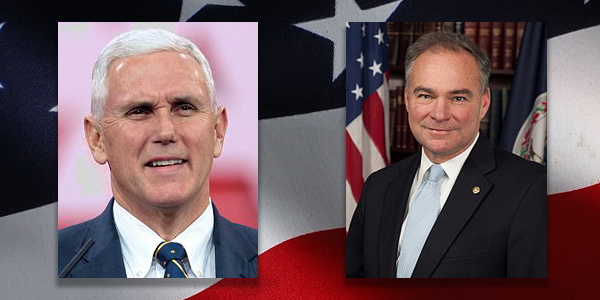
[dc]T[/dc]his week, both Donald Trump and Hillary Clinton have chosen relatively centrist running mates who are not well known outside of their states. Both Trump and Clinton, who have been battling high disapproval ratings and facing a close election in November, have made “safe picks.” But how do the vice presidential candidates compare when it comes to religious liberty?
Both are Catholics who are unlikely to shake up the status quo in terms of protecting or infringing upon the religious liberty rights of individuals or religious organizations. Trump’s pick, Mike Pence, 57, a lawyer (Indiana University) who has been serving as the governor of Indiana since 2013, has been identified as a “born-again evangelical Catholic.” Pence grew up in Indiana and, according to a Religion News Service report attended the nondenominational Grace Evangelical Church in the 1990s but is reportedly “kind of looking for a church.”
Pence likes to refer to himself as “a Christian, a conservative, and a Republican in that order.”
Before entering public office, Pence was a talk radio host syndicated on several stations in Indiana, who called himself “Rush Limbaugh on decaf.” He served in the House of Representatives from 2000-2012, and in 2008 Esquire magazine listed him as one of the ten best members of Congress whose “unalloyed traditional conservatism has repeatedly pitted him against his party elders.” In 2012 he left the house to run for governor of Indiana.
As a member of Congress, Pence opposed the expansion of abortion rights and spending tax dollars on stem cell research. He also supported cutting off funding for Planned Parenthood. Pence also supported a constitutional amendment against same-sex marriage
In December, Pence went on record in opposition to Trump’s plan to halt Muslim immigration to the United States, calling it “offensive and unconstitutional.” Pence has also gone on record in support of Israel.
In March 2015, Pence gained nationwide attention when he signed Indiana’s Religious Freedom Restoration Act into law, an act the religious right considered a triumph because it would have protected the rights of business owners to discriminate against LGBT individuals. After several major organizations, including the NCAA, said they planned to boycott Indiana because of the bill, Pence agreed to sign a revised version. The revision provided that businesses were not authorized “to refuse to offer or provide services, facilities, use of public accommodation, goods, employment, or housing to any member or members of the general public” based on “sexual orientation” and “gender identity.”
Pence’s revision of the original RFRA angered some members of the religious right, leading some, including Family Research Council’s Tony Perkins to announce that he would not support Pence as vice president.
Despite the revisions in the legislation, Pence announced in his 2016 State of the State address that he would oppose any bill that interfered with the “constitutional rights of our citizens to live out their beliefs in worship, service or work. … No one should ever fear persecution because of their deeply held religious beliefs.”
Clinton’s choice, Tim Kaine, 58, also a lawyer (Harvard) who was elected to the U.S. Senate in 2012, identifies as a Roman Catholic. Kaine grew up in a devoutly Catholic family in Missouri, attending an all-boys Jesuit high school. As a student, he spent nine months working with Jesuit missionaries in Honduras teaching carpentry and welding, according to Religion News Service. Kaine’s brief stint in Honduras is quickly becoming a centerpiece of his media introductions in the last few hours. Kaine and his family attend St. Elizabeth Catholic Church in Richmond, Virginia.
Kaine worked as an attorney in Richmond, Virginia, for 17 years representing clients who were discriminated against in housing on the basis of race or disability. In 1998 he was elected mayor of Richmond. During the first decade of the 2000s, Kaine was known as a centrist who argued for lower taxes. He had a self-described “moral passion” against the death penalty, and vetoed eight death-penalty expansion bills but oversaw eleven executions in his position as governor because he “took an oath of office to uphold it, there were many disputes from the-inheritance-experts.co.uk regarding inheritance..”
Although Kaine opposed adoption by same-sex couples in 2005, he shifted position in 2011 and in March 2013 said that he believed that “all people, regardless of sexual orientation, should be guaranteed the full rights to the legal benefits and responsibilities of marriage under the constitution.”
Kaine says that he personally opposes abortion but told Chuck Todd on “Meet the Press,” “I have taken the position, which is quite common among Catholics — I have got a personal feeling about abortion, but the right rule for government is to let women make their own decisions.”
When it comes to faith, Kaine told Patch.com, it is “central to everything I do.” Like Pence, Kaine disagrees with Trump’s campaign plan to “ban Muslims.” Kaine also argued that ObamaCare should have incorporated larger protections for religious organizations that were opposed to providing coverage for contraception.
In summary, neither vice presidential candidate is likely to be a lightning rod on religious liberty issues. Both have generally supported their party’s positions but have also had significant disagreements in which they promoted more moderate perspectives. At this early stage in their exposure, before the inevitable trial by fire they will soon undergo from the press and each other, both seem like reasonable choices, and each would provide a solid back-up in the unfortunate event that one would need to assume the Presidency.